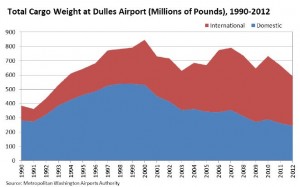by James A. Bacon
Cognitive Dissonance, anyone? There is an interesting juxtaposition of articles in The Washington Post today…. The local section carried an article about George Mason University President Angel Cabrera expressing support of the Bi-County Parkway, while the business section ran an article about a new report emanating from The Center for Regional analysis at GMU, which concludes that improved highway access would provide only a marginal benefit to Washington Dulles International Airport.
Chasing air cargo a fool’s errand. The Center for Regional Analysis report concludes that “improved western road access” to Dulles would increase demand for air cargo at Washington Dulles International Airport by only 8%. The McDonnell administration has cited the economic-development benefits of Dulles’ air cargo business as one of the main justifications for building the North South Corridor west of Dulles at a guesstimated cost of about $1.5 billion. (The most controversial segment of that corridor is the $400 million Bi-County Parkway.)
Coincidentally or not, the McDonnell administration has been downplaying the air-cargo angle recently. Many Prince William citizens are up in arms over the prospect of thousands of additional tractor-trailers using their roads and highways every day as the result of expanded air-cargo operations. Now it turns out that the aspiration to convert Dulles into a world-class air-cargo center is a pipe dream.
The working paper by David E. Versel, “Factors Affecting Air Cargo Operations at Washington Dulles International Airport,” notes that domestic air-cargo traffic has declined nationally since 2000 due to an intermodal shift from airplanes to trucks and trains. Meanwhile, the odds of gaining market share within a slow-growing international market are slim. The existing international gateways will not be easily displaced. “While opportunities do exist for Dulles Airport to expand its international air cargo activities, it will continue to be at a competitive disadvantage relative to other airports that have more international destinations,” Versel writes.
A 2010 study commissioned by the Metropolitan Washington Airports Authority (MWAA) projected air cargo traffic to 2030 by applying trend lines from 1990 to 2006. The volume of air cargo was expected to increase from 746 million pounds in 2006 to 1.76 billion by 2030. “The forecast now seems ambitious,” Versel observes dryly, “as the actual cargo weigh in 2012 had declined to 591 million pounds.”
A GMU survey of freight forwarders found that traffic congestion around Dulles was a relatively minor factor in decisions whether or not to ship air-cargo in and out of the airport. Schedules, route diversity and capacity were the driving factors. Local traffic congestion was classified as more of an annoyance. “Most air cargo movement occurs overnight,” writes Versel, “and is therefore not very sensitive to the negative congestion on surface highways around airports.” (If cargo transloaded to trucks moves mainly at night, it’s worth noting, foes’ fears of tractor-trailers creating congestion- and safety-related issues are probably exaggerated as well.)
A new rationale. So much for the air-cargo justification. But real estate developers really, really want to build the parkway, which would open up much of eastern Loudoun County for upzoning of projects already on the drawing boards. Enter Angel Cabrera.
Cabrera wants improved connectivity to fast-growing Loudoun County for GMU’s Prince William campus which serves more than 4,000 students and which anchors the county’s Innovation Technology Park. Many faculty and students live in Loudoun, he says. Writing in a GMU blog, he says:
As we continue to invest in this campus, create new programs in high-demand areas and attract millions of dollars in research funding, it is critical that the transportation infrastructure around our campus continues to improve. Both east-west connectivity — which facilitates access to and from our campuses in Fairfax and Arlington and the resources in the National Capital Region — as well as north-south connectivity — which facilitates access to the growing residential and business centers in Loudoun County and our future Loudoun County campus — are critical to our future and our ability to deliver on our mission.
Bacon’s bottom line: Just as the air-cargo ploy goes down in flames, Cabrera seemingly has extended a lifeline to Bi-County Parkway supporters. But has he really? The majority of students at the Prince William campus commute from around the region because there is only one residence hall serving the campus, the GMU president mentions in passing. Hmmm…. Which would be more cost effective — building a couple of dormitory buildings with dedicated revenue streams at $20-$30 million a pop or building the $400 million Bi-County Parkway? Cabrera doesn’t ask that question. But taxpayers should.



